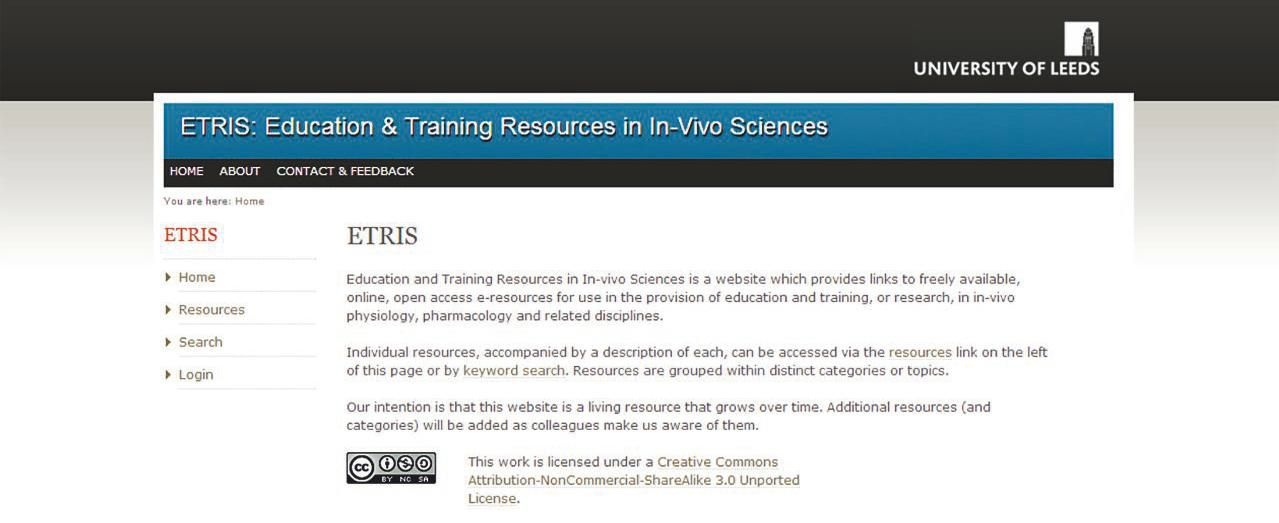
Physiology News Magazine
ETRIS: facilitating research and training in in vivo physiology
Membership
ETRIS: facilitating research and training in in vivo physiology
Membership
Dave Lewis
School of Biomedical Sciences, University of Leeds, UK
https://doi.org/10.36866/pn.97.42
The transposition of EU Directive 2010/63/EU in UK law has introduced new training and competency requirements for scientists working under the Animals (Scientific Procedures) Act 1986. Both the Directive and the amended Act explicitly state that staff must be ‘adequately educated and trained’ and ‘that they shall be supervised in the performance of their task until they have demonstrated the requisite competence’. In addition to initial Home Office accredited modular training, there is now also a requirement, throughout a researcher’s career, for them to receive continued on-the-job training, to participate in other continuous professional development activities, and to have a reassessments of their competencies at regular intervals. ‘Training for the acquisition, maintenance or improvement of vocational skills’ is a permissible purpose under the amended Act and therefore all researchers (not just practising microvascular surgeons) can now use research animals in their training, as well as in the development and maintenance of their technical competencies.
However, the use of animals for training is contentious. They should only be used, if absolutely necessary, and only during the final stages of training. For example, after the observation of similar studies, viewing or utilising electronic resources, and practising the setting of experimental preparations using cadavers. Electronic resources are increasingly being used in the early stages of this process to supplement hands-on experience. Whilst many excellent e-resources have been developed, significant numbers are locked behind the websites of institutions, commercial or professional organisations, only available to members or subscribers. Those that are freely available are often unknown to the community.
In response to this problem, ETRIS (Educational and Training Resources in in vivo Sciences, www.etris.leeds.ac.uk) was developed. ETRIS is a website which provides direct links to free, open access, or open educational e-resources which deliver training or facilitate research in in vivo physiology and pharmacology. In addition to a direct web link to individual resources, each is accompanied by a descriptive paragraph which outlines what is in the resource, its provenance, copyright or access restrictions and suggested usage or audience. All resources are vetted to ensure compliance with the Animals (Scientific Procedures) Act and best practice in the 3Rs. Resources are grouped into 13 categories spanning the entire spectrum of resources required by practising in vivo scientists including animal welfare and husbandry, ethics and the 3Rs, experimental and statistical design, and surgical procedures. ETRIS is free to use, and no log-in or registration is required. Individual resources can be located using the search function or clicking on a resource category.
The plan is for ETRIS to be a living repository of resources, which grows and expands over time. However, this will only happen with the help of the community. Therefore if you have any e-learning or training resources, including, but not restricted to, videos, podcasts, guidance notes, software or educational protocols that you are willing to share or know of any relevant resources on open access websites, please contact Dave Lewis at 3Rs@leeds.ac.uk. Resources do not have to fall within existing categories; resources in other areas not currently covered are also required. Likewise, please use ETRIS; share the site with your colleagues, link to it from your institutional or company Biomedical Services or Home Office websites. Your feedback on the site or individual resources would also be appreciated.
ETRIS was developed through the award of a University of Leeds Teaching Fellowship to Dave Lewis. The support of the University for this project is gratefully acknowledged.

